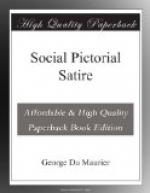[Illustration: A TOLERABLY BROAD HINT
“Oh, I beg your pardon, sir, but you didn’t say as we were to pull up anywhere, did you, sir?”—Punch, 1859.]
Where most of all he gives us a sense of the exuberant joyousness and buoyancy of life is in the sketches of the seaside—the newly discovered joys of which had then not become commonplace to people of the middle class. The good old seaside has grown rather stale by this time—the very children of to-day dig and paddle in a half-perfunctory sort of fashion, with a certain stolidity, and are in strange contrast to those highly elate and enchanting little romps that fill his seaside pictures.
Indeed, nothing seems so jolly, nothing seems so funny, now, as when Leech was drawing for Punch. The gaiety of one nation at least has been eclipsed by his death. Is it merely that there is no such light humorist to see and draw for us in a frolicsome spirit all the fun and the jollity? Is it because some of us have grown old? Or is it that the British people themselves have changed and gone back to their old way of taking their pleasure sadly?
Everything is so different, somehow; the very girls themselves have grown a head taller, and look serious, stately, and dignified, like Olympian goddesses, even when they are dancing and playing lawn-tennis.
I for one should no more dream of calling them the darlings than I should dare to kiss them under the mistletoe, were I ever so splendid a young captain. Indeed I am too prostrate in admiration—I can only suck the top of my stick and gaze in jealous ecstasy, like one of Leech’s little snobs. They are no longer pretty as their grandmothers were—whom Leech drew so well in the old days! They are beautiful!
And then they are so cultivated, and know such a lot—of books, of art, of science, of politics, and theology—of the world the flesh, and the devil. They actually think for themselves; they have broken loose and jumped over the ring-fence; they have taken to the water, these lovely chicks, and swim like ducklings, to the dismay of those good old cocks and hens, their grandparents! And my love of them is tinged with awe, as was Leech’s love of that mighty, beautiful, but most uncertain quadruped, the thoroughbred horse—for, like him, when they are good, they are very, very good, but when they are bad, they are horrid. We have changed other things as well: the swell has become the masher, and is a terrible dull dog; the poor little snob has blossomed into a blatant ’Arry, and no longer wears impossible hats and iron heels to his boots; he has risen in the social scale, and holds his own without fear or favour in the Park and everywhere else. To be taken for a haristocrat is his dream!—even if he be pelted for it. In his higher developments he becomes a “bounder,” and bounds away in most respectable West End ball-rooms. He is the only person with any high spirits left—perhaps that is why high spirits have gone out of fashion, like boxing the watch and wrenching off door-knockers!




